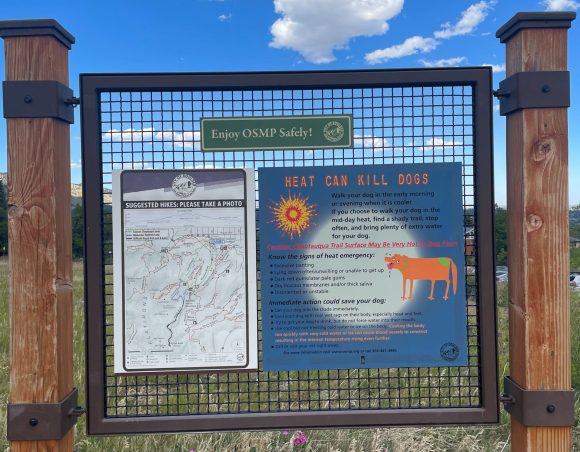
Photo of the sign at Chautauqua Park.
Snouts are panting, paws are scorching and tails are not wagging. You cannot enjoy the outdoors with your favorite canine if it is too hot to walk. Thanks to climate change, the temperatures are rising and there is less precious walking time.
There is an expiration date on dog walking and our furry friends know it too. All of us need to stop acting like humans are the only inhabitants on this planet. Let’s take matters into our own hands by decreasing our carbon footprint.
Our beloved Chautauqua Park has made it abundantly clear that our dogs are suffering heat-related health issues. At the trailhead, there is a sign with a graphic cartoon image of a dog suffering from heat stroke, proceeding the title “Heat Can Kill Dogs.” The signage describes the symptoms of a heat emergency as extreme panting, unwillingness to walk, darkened colored gums, thick saliva and overall disorientation.
Finding shade, using a cold, wet rag on their head and feet, offering water and rubbing cold water or ice on their body can help alleviate the worst of these symptoms. The sign warns that “cooling the body too quickly with very cold water or ice can cause blood vessels to constrict resulting in the internal temperature rising even further.”
The poster at the trailhead encourages residents to walk their dogs in the early mornings or evenings to escape the sun. The magic of the sun, and all of the endorphins and vitamins it has to offer, is now reduced because of its natural and beautiful warming abilities.
From 1880-1981, our planet’s temperature rose 0.14 degrees Fahrenheit a decade. This period corresponds with industrialization and a massive uptick in carbon emissions. Since 1981, that number has more than doubled to 0.32 degrees Fahrenheit in just a decade.
According to Climate Central, when air temperatures reach 77 degrees Fahrenheit, asphalt surfaces reach at least 125 degrees Fahrenheit. This temperature is dangerous for a dog’s unprotected paws because it is high enough to burn skin.
Assistant Director of the Center for Environmental Journalism Hillary Rosner said climate change is a shift in our global climate caused by fossil fuel emissions and an increase in carbon dioxide levels in the atmosphere.
“Here in Boulder, we are seeing definitely warmer temperatures in the summer and in the winter,” Rosner said. “We are also seeing less rainfall and a shift in when the snow falls. When I first moved here, 20 years ago, it wasn’t weird that you could ski at Thanksgiving and you could certainly ski in early December. Now, I cannot remember the last time I went skiing before Christmas.”
Chautauqua Park naturalist, Devyn Palm-Trujillo, said Boulder’s most severe issues are the county’s intense wildfires.
“Our ecosystem is fire-adapted,” Palm-Trujillo said. “It has evolved to withstand low-intensity fires. But climate change, the drought, higher temperatures and many other factors are making these wildfires so intense and dangerous for our community that lies next to the mountains.”
A frequent Chautauqua Park hiker and dog-mom to two Golden Retrievers, Shannon Typher, said she had to purchase equipment to walk and hike at night because that’s the time when her dogs will be most comfortable.
Species have relied on sustainable and constant symbiotic relationships and food webs for centuries. Climate change is relentlessly putting ecosystems out of sync. Rosner said the exponential increase in temperature is forcing wildlife in Boulder, and across the world, to suffer due to the environment’s unnatural state.
“We are seeing a lot of creatures moving up in elevation or latitude,” Rosner said. “And then you see high elevation animals really suffering because they cannot go any higher up because there is nowhere else to go.”
Palm-Trujillo said the shift in where wildlife inhabit can be dangerous for dogs who are off-leash. She added a Boulder dog’s biggest threat is a moose.
“Moose are super combative,” Palm-Trujillo said. “They are not like bears. You cannot just scare them off; they will fight. If we continue to see more moose in the area, that will be problematic.”
New wildlife also introduce non-indigenous parasites and diseases to dogs, Rosner said. Warming temperatures are expanding the range of pests animals have to deal with.
Rosner said some dogs are getting sick from Leose Cirrhosis, a virus residing in standing water.
“If there is a puddle or body of standing water where other wildlife is drinking from, and then your dog goes in to splash around or tries to drink it, they could [contract the virus],” Rosner explained.
Rosner said Lyme Disease, ticks and Rocky Mountain Spotted Fever were not prevalent in the Boulder area twenty years ago. Now veterinarians recommend vaccinating pets for these illnesses.
Typher said she encourages all community members to continuously watch their carbon footprint. It’s a human’s job to change the world’s climate trajectory for all living beings.
While it may not be possible to eliminate all greenhouse gas emissions everywhere, we can start in our little oasis and historic home against the Flatirons.
Consider implementing these changes starting now, so we do not have to abide by the sun’s rays to frolic with our favorite friends. Practice walking, riding a bike or taking the BuffBus or RTD transit options.
A trip to Hapa Sushi on Pearl doesn’t always warrant a drive. Remember to turn off your lights and air conditioning when you are not using them.
Keep up your HydroFlask commitment to avoid plastic use. Go thrifting and spend the same amount of money and time scavenging garments, and simultaneously be sustainable.
Help save this planet, if not for yourself then for your special four-legged friend. Reduce your carbon footprint, so you and your dog can continue enjoying the outdoors.
Contact CU Independent Staff Writer Chloe Wasserstrom at chloe.wasserstrom@colorado.edu.
